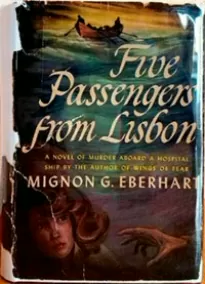Five Passengers from Lisbon

- Автор: Mignon Eberhart
- Жанр: Детективы
Читать книгу "Five Passengers from Lisbon"
2
Marcia opened her eyes.
She was aware first of warmth and comfort, of soft blankets and clean, sweet-smelling sheets; she had been aware of that for some time really, and of the distant throb and vibration of the engines.
For an instant she looked at the small, cheerful cabin. There were double-decked bunks, accommodating four people; gay, chintz-covered chairs, a book shelf, a door leading to the passageway probably and another, open, to a tiny bathroom; there were two round ports and the light was on so it must be, again, night. She was still on a ship, but it was so sharply different from the dirty little Portuguese ship, so clean and shining and warm and with such an atmosphere of comfort, that she savored it gratefully, not thinking. And then she saw a slipper, shabby, high-heeled, rimy from sea water, lying on the floor. It was Gili's slipper.
Sharply then she remembered everything and sat up. Every muscle ached as if she had been beaten, but she was alive and warm. The miracle had happened; she was still Marcia Colfax, breathing, thinking, still linked up with her own destiny.
The two bunks directly opposite had been slept in and were still not made up. A tray with empty dishes and a coffeepot stood on the table. Someone had placed a crimson bathrobe across the foot of her own bunk. She was wearing, she discovered, pale-gray flannel pajamas which smelled of soap. She reached for the bathrobe and every muscle throbbed but the pain was, just then, welcome; it confirmed the miracle of, simply, being alive. She wrapped the crimson robe around her and, as she did so, the door into the passageway opened quietly and a nurse looked in, saw that she was awake, smiled and came into the cabin. She was young and pleasant; she was in uniform, beige and white striped seersucker which looked very crisp and clean, and she carried some clothes over her arm.
"Awake," she said. "I'm Lieutenant Stoddard. How do you feel? I've brought you some clothes."
"I feel wonderful," said Marcia. Her voice sounded hoarse and weak. "I can't believe it. It really is a miracle,"
"Not at all," said Lieutenant Stoddard. "People are rescued every day." She put down the clothes, carefully depositing a pair of brown oxfords on the floor. "I'll just make sure you are all right," she said and came to Marcia, and put her fingers on her wrist. "Well, no double pneumonia here. I'd better take your temperature, though."
She shook the thermometer briskly.
"Where are the others? Is everybody all right? Is—Mickey . . . ?" She suddenly remembered that on the
She must have thought that Marcia's eyes were questioning, for she went on, pleasantly: "I expect you don't even know where you are. It's a hospital ship, the
"The others . . ." said Marcia around the thermometer.
The young lieutenant turned to close the port behind her. "Quite all right, I believe. We gave everybody treatment for shock. Mr. Cates was the worst off; he had to have digitalis and I don't know what all, but he's all right now except for a cold. Mr. Messac is up and about, too. He looks quite all right." She turned back, but her eyes avoided Marcia's. "We let you sleep as long as you could." She waited another moment or two, removed the thermometer, glanced at it and said: "Perfectly normal. Now then, I'll get you something to eat."
She smiled again, gave a little nod and went quickly away. Marcia still savoring the warm comfort of the bunk and the tiny shining cabin, lay back luxuriously on the pillow. It was night again; she had slept probably almost around the clock. Mickey was all right, then; everybody, thought Marcia comfortably, was all right, and she slipped into a dreamy state which was not quite sleep but near it, so it seemed to her only a moment until the crisp, pleasant young nurse came back.
It was not, in fact, until she'd had food, hot soup and hot steak and hot coffee; until she'd had a hot bath with the incredible luxury of all the soap she wanted and was dressed —in a nurse's uniform, as a matter of fact, which luckily fit—that she had any warning that everything was actually all wrong. But even then she did not know that Alfred Castiogne was dead. The nurse only said that the ship's Captain wanted to see her. "He asked me to bring you to him as soon as you were awake. Do you think you're quite up to it?"
She had been thinking, naturally, of seeing Mickey. "The ship's Captain?"
"Captain Svendsen." The nurse hesitated. "I think it is rather—important." Something in the nurse's manner and voice seemed to be evasive. Five years in warring Europe had given Marcia an awareness of the very breath of danger. She looked quickly at the nurse. "What is wrong? What has happened?"
Lieutenant Stoddard bit her lip. "I'd better take you to them. If you're quite sure ..."
This time Mickey's assumed name came out naturally, without intention.
"Is it Andre? Andre Messac? Is anything wrong?''
"Oh, no, no. Mr. Messac is quite all right. Really, Miss Colfax. It's only—they'd like to ask you some questions, I think."
Questions? She considered it slowly; but naturally, there would be questions: her name, her destination, matters of record.
The nurse continued: "I brought you a coat too, Miss Colfax. I'm afraid yours is ruined with sea water. It's a nurse's coat. I guessed at size twelve." She held up the brown, trimly tailored coat with its gay scarlet lining and slipped it around Marcia's shoulders. "How do the oxfords feel? We had a time getting clothes for Mrs. Cates; she's so thin and yet tall, you know. And those beautiful fur coats . . ." The nurse shook her head and ushered Marcia into the narrow, long passage that ran the length of the cabin doors. It did not occur to Marcia that she kept on chattering, "We cleaned them as best we could, but sea water is so horrible. This way, Miss Colfax."
The passageway was painted gray and glittered with cleanliness. The air was fresh and warm and there was an inviting, floating fragrance of coffee and the clean smell of antiseptics. She caught a glimpse of a slender, crisply uniformed figure of a nurse going into a cabin ahead of them; doors were open here and there, giving glimpses of other cabins; of a glittering little diet kitchen; then they emerged into a transverse corridor, and open stairs like very sound and substantial ladders with stout railings, going up and down. There were people—corpsmen in white, two medical officers in uniform, talking to a transport corps officer; she had a quick glimpse of a corridor leading to a sick ward with its rows of double bunks and lights and several soldiers also in red bathrobes helping put up a screen for movies. Over and above everything was an indescribable sense of warmth and cleanliness, happiness and home. It struck Marcia with a poignancy that was like a comforting hand. An American ship; a mercy ship and she and Mickey were on it, safe and cared for and warm and going home. The nurse must have seen something of her feeling in her face, for she laughed a little, softly. "I know what you're thinking."
"It doesn't seem real. It's all so—so American. Clean and efficient-looking and plenty of everything. It's like being at home."
"I know. You should see some of our patients when they get their first meal aboard. Milk. Eggs. Steak. Some of the cast cases gain so much weight that we have to change their casts. Around this landing. That's right. I'll take you through the wards some time. Up again."
They climbed more stairs. They were easier for Marcia to climb than the first; her muscles were less stiff and sore; sleep and a hot bath and food could work miracles, too. The whole ship seemed a miracle, with the radiance of its lighted Red Cross shining out over the sea. But a modern and a scientific, as well as a merciful miracle. They reached another deck. Everywhere, above and below, she caught glimpses of men in uniform, nurses in uniform, going quickly and quietly about their business. None of them so much as gave her a glance. She had even then a sense of the organization, the detailed direction and never-relaxing activity that went on constantly, at every instant, all over the ship; later, gradually, a complete and awe-inspiring picture of that organization was to emerge—its scientific thoroughness, its personal devotion, its vigilance and its immeasurable triumphs.
Lieutenant Stoddard, her bright bar shining on one collar lapel and the nurse's caduceus, equally shining, on the other, again caught something of Marcia's thoughts. "It's a floating hospital," she said, "We have everything—laboratories. X-ray rooms, three operating rooms . . . I'll show you that, too."
Her face was shining almost as brightly as her lieutenant's bars. Marcia said: "I envy you. To be able to serve, like this . . ."
"I wouldn't trade these three years for anything in the world," said Lieutenant Stoddard, simply and sincerely. She took Marcia's arm lightly. "We go forward now. This way . . ."
Again they walked along a narrow, shining gray passageway with the slight, accustomed motion of the ship seeming to push itself a little stronger against their feet as they approached the bow and the Captain's quarters. They stopped before a door at the end of the passageway. It was closed. Lieutenant Stoddard knocked, and it opened. The nurse said: "This is Miss Colfax, sir," and a slim, young Major said, "Thank you. Lieutenant," and held the door wider for Marcia to enter.
It was a small room, paneled, with built-in wooden cabinets and shelves; there were deep red leather-covered chairs and a sofa, a rack of pipes, a solid table built crosswise below the square windows opposite and laden with papers and books, photographs and lamps; it had a look of home and comfort. An open door at the left showed a bunk, neatly made up with a cheerful red-plaid cover. There were three men in the room and Mickey was one of them. He came to her at once.
"Marcia! Are you all right? They said it was better for you to sleep. I've been worried about you." He took her hand and smiled down at her. He was wearing an olive-drab army uniform, but without insignia; he looked still rather white and drawn, but was cleanly shaven and obviously rested, with his blond hair still damp apparently from the shower. "Something pretty bad has happened, Marcia. They want to . . ."
"If you don't mind, Mr. Messac," said someone rather sharply behind him. A man had risen from the chair beside the table; he was in blue uniform with the four gold stripes denoting his rank across his sleeve. He was stocky, and very powerful-looking, with very yellow hair, eyebrows that were white and heavy, a red, weathered face and narrow, intensely sharp blue eyes. He said: "I am Captain Svendsen, Miss Colfax. This is Major Williams." The young major who had opened the door bowed briefly. Captain Svendsen indicated one of the red chairs with a thick, powerful pink hand and said: "Will you sit down?"
Mickey said: "May I tell her, Captain?"
But Captain Svendsen's hand remained firm until Marcia sat down. Then he replied shortly: "I will, Mr. Messac." He resumed his own seat, and said: "Miss Colfax, did you know the third officer on the
"The third officer . . ." began Marcia, puzzled, looking to Mickey for enlightenment and Mickey said quickly: "Castiogne. I told them, of course, that you had never seen him before we got on the Portuguese ship. . . ."
"Mr. Messac." The Captain's voice snapped out like a whiplash. He leaned forward. "I'm master of this ship, Mr. Messac. The responsibility for this is altogether mine."
"You are making it unnecessarily hard for Miss Colfax," said Mickey.
"Mickey, what is it? What is wrong?"
"Castiogne ..." began Mickey, and the Captain said:
"That is all, Mr. Messac. I'll talk to Miss Colfax alone. Major, . ." He nodded toward the door. The slim young Major advanced imperturbably and opened it. Mickey said: "Oh, nonsense, I'm going to stay. Miss Colfax and I are to be married as soon as we get to America. I have a right to stay. . . ."
"You have no right that supersedes mine on my ship, Mr. Messac," said the Captain.
Mickey shrugged, started to speak, stopped, finally said: "I beg your pardon."
The Captain leaned back in his chair. His thick, white eyebrows were drawn angrily together above his deep-set, shrewd eyes. "I've no objection to your remaining, Mr. Messac, if you'll be so good as to keep quiet. Answer my question, please, Miss Colfax. Did you know Alfred Castiogne?"
She glanced at Mickey who was now staring at the rug, his hands linked behind his back as if to hide the deformity of tortured fingernails. She said: "He was on the lifeboat."
"Did you know him before you left Lisbon?"
"No. To my knowledge, I had never seen him before."
Mickey made a movement of impatience and checked it. The Captain said: "You know, of course, exactly who was in the lifeboat?"
"Why, I—yes, of course. Myself and . . ." She started to say Mickey and sensed something very still and waiting about Mickey's bent head and quickly substituted "and Andre. Mrs. Cates and her husband. Gili—that is, Gili Duvrey. This man, Alfred Castiogne. I think two seamen, but I don't remember their faces and I don't know their names. That's all."
"Who of them knew Castiogne best?"
"We were all passengers, that is, except the seamen."
"Please answer my question."
"But none of us knew him!" Suddenly she remembered Gili's flirtation with the dark, garlicky third officer. Was that what he meant? But why? She said slowly: "I think Miss Duvrey saw something of him on the ship. We were only three days out when the storm struck. She couldn't have known him well. If you'll tell me. Captain Svendsen, why you are asking . . ."
The Captain leaned forward. "It is no secret. Miss Colfax. This third officer, this Alfred Castiogne, was murdered."
It had no reality. She repeated, "Murdered . . ." almost politely, as if she had not heard it rightly.
"He was stabbed," said the Captain slowly. "He died of hemorrhage from a knife wound in his back. Obviously . . ." He frowned and said: "Obviously he was murdered in the lifeboat."
It was very quiet. No one moved; for a second or two it was as if no one breathed; as if the word itself had a paralyzing effect. But that, thought Marcia strangely, finally, was the thing they had left behind. Murder and more murder. Violence, terror and betrayal; bombs and guns and knives and torture. Her hands were digging into the red arms of her chair. The young Major over by the door moved suddenly, got out a package of cigarettes, glanced at the Captain and shoved it back into his pocket. Mickey was staring silently again at the carpet, his hands knotted behind him. Mickey who had seen so much of the blood and horror of Nazism.
"But I don't understand ..." A small blurred memory of the night returned to her. She cried: "He was rowing! He was directing everybody. And a dead man floated past and he— Alfred Castiogne—looked at him. I saw it. He lifted the body from the water."
"When was that?"
"I don't know." It was confused, horrible, all of it. She looked at Mickey for confirmation and Mickey was trying to tell her something. She could see it in the look he gave her; but what was it?
The Captain insisted. "When did that happen, Miss Colfax? Try to remember."
"I don't know. I can't possibly say. But Castiogne was alive then."
"You say you saw him lift the dead man from the water. It must have been light enough to see objects and movement. It must have been nearly dawn."
She nodded, still aware that Mickey was trying to communicate some message without words, without motion, with only that steady yet somehow warning look in his clear gray eyes. She replied to Captain Svendsen: "Why, yes. Yes, I suppose so. I can't remember much of it."
"When did Castiogne collapse, then? How much later?"
She tore her gaze from Mickey's urgent look and met the Captain's intent, shrewd eyes. "I don't know exactly. I believe that I noticed that he had collapsed about the time we sent up rockets."
The Captain turned to Mickey. "Is that as you remember it?"
Mickey shrugged. "It's as I told you. I remember thinking that he'd collapsed and somebody tried to revive him, one of the other seamen, I think. It was about the time we sighted your ship. But everything was very confused."
The Captain looked again at Marcia.
"Miss Colfax, let me put a frank and point-blank question. It will save time and trouble for everybody if you'll answer it frankly. Is there anything at all that you know or saw in that lifeboat which might have something to do with the murder of this man? Take your time. Try to remember."
But there was nothing; she shook her head.
"Everything was terribly confused. Time didn't mean anything. People moved about; we had to. But the only thing we thought of was the storm and the waves, and keeping the boat from being swamped. I cannot believe that he was murdered. . . ."
Captain Svendsen interrupted. "Miss Colfax, I want you to tell me everything you can remember of the lifeboat; everything that happened. . . . Don't be in a hurry; take your time. Start with abandoning the ship. Who put you in the lifeboat? Who sat beside you? Who in front of you? What was said and done? Who saw the
"I didn't know Castiogne was dead. I didn't see anything. . . ."
Captain Svendsen sighed; he had a deadly patience; it angered him to be obliged to draw upon it, but he never quibbled with necessity. He began: "Who sat nearest you?"
His patience, though, had few results, beyond the small details Marcia remembered from the night. Replying to his questions, she told how they had left the
"After you sighted us?"
She thought back as one tries to pierce the convolutions of a long and shifting dream. "Yes. We hunted for rockets. Everybody seemed to shift and move about."
"Castiogne, too?"
"I don't remember."
"But it was after that that he collapsed?"
She corrected him: "It was after that that I saw he had collapsed. One of the seamen tried to help him."
"Which one?"
"I don't know their names. He was short and thick."
"Go on."
Go on? Well, what had happened then? They had sent up rockets. They had rowed and watched the waves and rowed and looked when they could, when they dared, when there was no curling black wave rising between, for the red glow that was the





